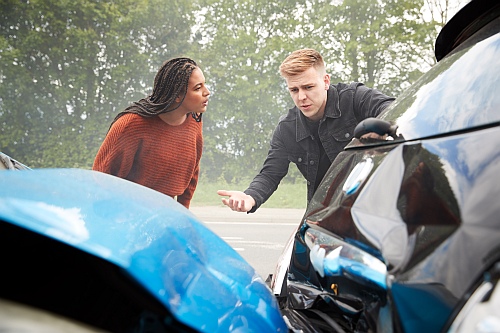It is quite common for modern businesses to contract out maintenance or cleaning responsibilities to third-party entities that specialize in providing those services. Although this outsourcing of responsibility may help make business function more efficiently, the wide array of possible contractual relationships can create confusion when a person is injured as a result of the negligence one or more of the contracting parties. This possible muddling of responsibility is addressed in a recent opinion from the Georgia Court of Appeals, Davidson v. Meticulously Clean Sweepers, LLC.
The Davidson case arose from a slip and fall accident at a Dollar Tree store in Macon, Georgia. As a winter storm approached in January 2011, “Rivergate,” which is composed of three corporate entitles that own the shopping center in which the Dollar Tree is located, asked Meticulously Clean Sweepers to perform de-icing services at the shopping center pursuant to a contract to perform sweeping services at the site. The storm arrived on January 10, and Meticulously Clean performed de-icing services on January 9th, 11th, 12th, and 13th. On the morning of January 12, a customer who would become one of the plaintiffs in this case arrived at the shopping center and, while navigating her way to the entrance of the Dollar Store, fell on a patch of black ice. The customer photographed the black ice patch and later testified that she had both taken care to avoid other puddles and that the black ice patch on which she slipped was not obvious and would not have been reasonably seen by someone who was attentive to where he or she was going. In October 2012, more than a year following the accident, the customer and her husband brought a premises liability suit against Rivergate, Rivergate’s property management company, Dollar Tree, the manager of Dollar Tree, and Meticulously Clean Sweepers. In May of the following year, the plaintiffs settled with all the defendants except Meticulously Clean. Following further discovery, Meticulously Clean moved for summary judgment, contending that it could not be held liable as a matter of law because the injured plaintiff was not an intended third-party beneficiary of the contract between Meticulously Clean and Rivergate, no evidence showed that it breached a duty of ordinary care, and no evidence showed it had superior knowledge of the hazardous black ice to the plaintiff. The trial court granted the motion for summary judgment, and the plaintiffs appealed.
In its decision, the Georgia Court of Appeals unanimously affirmed the trial court’s grant of summary judgment. First, with respect to the plaintiff’s argument that Meticulously Clean negligently performed its services under its contract with Rivergate, the Court of Appeals cited binding precedent from the Supreme Court of Georgia that held “an injured [plaintiff] may not recover as a third-party beneficiary for failure to perform a duty imposed by a contract unless it is apparent from the language of the agreement that the contracting parties intended to confer a direct benefit upon the plaintiff to protect him from physical injury.” Anderson v. Atlanta Committee for the Olympic Games, 273 Ga. 113, 117-118 (4) (537 SE2d 345) (2000) (internal quotation marks omitted). The sweeping agreement between Meticulously Clean and Rivergate is quite clear that Meticulously Clean was an independent contractor and not an agent of Riverage and further directly states, “[n]o third parties . . . are intended to, nor shall they be deemed to have a right to benefit from, or seek to enforce, any of the provisions” of the contract. Therefore, as a matter of law, it could not be held that the contracting parties intended to directly confer a benefit on the injured plaintiff. To the contrary, the agreement clearly disavowed the creation of any such entitlement.
Next, the Court of Appeals addressed the plaintiffs’ argument that, independent of alleged negligence pursuant to the terms of the contract, Meticulously Clean was nonetheless negligent in exercising reasonable care in de-icing the premises. Again, however, the Court of Appeals sided with the defendant. Under Georgia law, “one who undertakes, gratuitously or for consideration, to render services to another which he should recognize as necessary for the protection of a third person or his things, is subject to liability to the third person for physical harm resulting from his failure to exercise reasonable care.” Huggins v. Aetna Cas. Co., 245 Ga. 248, 249 (264 SE2d 191) (1980) (quoting Restatement (Second) of Torts § 324A). Since de-icing services can reasonably be recognized as necessary for the protection of third parties, it follows that Meticulously Clean could be held liable for negligence generally. However, the Court of Appeals found that the plaintiff failed to provide any evidence that Meticulously Clean failed to exercise reasonable care in performing its de-icing services. In this case, the only direct evidence related to Meticulously Clean services at the site was that it applied a de-icing mixture to the area the night before the fall. Although the plaintiff contended that applying the mixture affected the melting and freezing process in the area where the black ice formed, the Court of Appeals held that the plaintiff failed to provide evidence that would tend to show how application of the mixture led to formation of the black ice patch. In addition, the existence of black ice alone is insufficient to show that an entity had performed de-icing services negligently. See generally Speaks v. Rouse Co. of Ga., 172 Ga. App. 9 (321 SE2d 774) (granting motion for summary judgment in black ice slip and fall case when there was “no affirmative evidence” that the property owners had “performed any act to make the presence of ice or snow more dangerous than it was in its state of accumulation” and when the plaintiff was “aware of the presence of water and the fact that the water could freeze.”).
While the court affirmed the trial court’s grant of summary judgment, the court did allude to certain facts one could use to show that a defendant had negligently performed de-icing services. For instance, had a defendant improperly formulated the mixture it applied to the area or applied an inadequate amount, given the condition of the area or strength of the storm, one could argue there was a failure to exercise reasonable care.
Beyond this useful allusion, the Court of Appeals’s decision displays the complexity that arises in even straightforward slip and fall litigation, especially when the acts of independent contractors are involved. Accordingly, anyone considering bringing action for a slip and fall should consider acquiring representation from counsel with experience in this area of the law. The Atlanta premises liability lawyers at the Law Office of Terrence R. Bethune have many years of experience with premises liability and other forms of negligence litigation and can provide the competent representation you may need. Feel free to contact us for a free case consultation.
Subject Related Articles

Navigating Macon Car Accident Claims: Step-by-Step Guide
You’ve been in a Macon car accident, and now you’re faced with insurance claims, police reports, car repairs, and more. It can feel overwhelming trying
June 24, 2024

Avoid These Mistakes After a Car Accident in Carrollton
You’ve just been in a car accident in Carrollton. Even minor fender benders can be stressful events. But before you step out of the car
May 20, 2024

What to Do After a Hit-and-Run Accident
So you’ve just been in a hit-and-run accident. Your first thought is probably to chase down the other driver, but that may not be the
April 19, 2024





